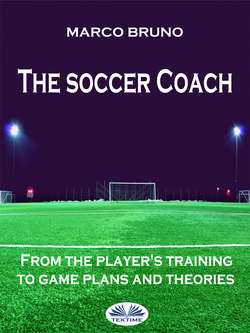Читать книгу The Soccer Coach - Marco Bruno - Страница 10
TRAINING OF YOUNG PLAYERS
ОглавлениеIt is opportune to dwell first on the most serious errors that are committed with regard to the goals of youth training.
The first mistake is to relate the young to a reduced image of the adult without considering that he has a personality still in training, ways of thinking still evolving and above all completely different physique and abilities. Adult training cannot be transferred to the youth sphere, perhaps only by paying attention to reducing the quantity and intensity.
The increase in physical capacity cannot be proposed in the same way for young people and adults, indeed there must be further differentiation even in the same youth field, according to age groups.
Lead, for example, a cycle of training for 12-13 year olds (very young) with the aim of achieving maximum performance to achieve immediate successes; it means distorting the spirit of training itself; in fact, the boy must be led gradually and in small steps and over the years towards the desired return.
A preparation too fast and early, which is usually always linked to achieving ambitious goals for adults, will give significant results in the short run, but it certainly causes damage that almost always are irreversible.
When young people and adolescents in particular are subjected to an excessive physical and psychological burden, their motivation for what they are doing decreases; their desire diminishes until they reach a real refusal in the face of the first failures. So you can understand how many times the young players after training with their team, find themselves (in the oratory, in the yard or in open spaces) to finally play soccer.
A graded and targeted workout leads to a higher degree of physical and athletic preparation in adulthood and keeps it stable longer over time.
At the end of the youth cycle the player must:
have reached a correct physical maturation;
have acquired a complete technical background;
have acquired a correct tactical sense;
have developed the so-called “qualities of will” indispensable to obtain lasting results, that is:
availability for group work;
collaboration spirit;
willingness to learn and work;
awareness of improvements through commitment;
desire to emerge.
These qualities act positively not only in sports, but they are a great help to face life and the difficulties of every day.
Alongside these primary objectives, we must consider other aspects that are of great importance for the training of young people:
- maintenance and care of health and personal hygiene;
- the organization and employment of free time;
- the game of soccer and its training must remain in second place with respect to school or work;
- training must not involve risks to the health and future growth of the young person;
- joy and serenity must always be placed in the foreground: therefore avoid tiring, monotonous and repetitive workouts (this does not mean that you cannot repeat exercises already carried out);
- young people must always be able to draw constructive and socializing experiences from training;
- along with soccer young people must be able to pursue other interests especially at a cultural level.
The coach of the youth sector must know how to recognize a potential soccer player by evaluating his skills and competences related to:
TECHNIQUE:
- global attitude to movement;
- sensitivity to ball contact and skill in its control;
- good attitude to defend the ball in certain game situations.
TACTICS
- sense of orientation;
- promptness in the ability to judge on the advance planning of offense and defending play moves.
PERSONALITY QUALITIES:
- ability to impose himself;
- resoluteness of purpose;
- constancy of will;
- good social behavior;
- modesty in knowing how to put oneself at the service of others.
PHYSICAL CHARACTERISTICS:
- physical constitution which reveals an adequate and regular development;
- potential athletic skills.
Training young people means above all being able to correctly implement all the phases of the general education strategy:
- knowledge of the student in reference to his motor development;
- knowledge of educational problems in different age groups;
- continuous evaluation of the variations induced in the personality and maturation of the young, from the environmental influence and from the physical-motor educational action.
Especially for young people up to 14/15 years, the coach must follow as closely as possible the principle of versatility.
The versatility is the main way to make the students undertake a serious, correct and valid start up to the sport; It requires:
- analytical interventions (development of auditory and visual perception, sensory-motor coordination, of fine movements);
- global interventions (multivariate sequences, mixed paths, multipurpose games, team games);
- timely interventions (the right thing at the right time).
